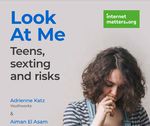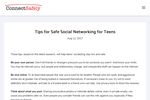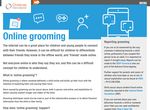2021 Online Safety - The Appleton School
←
→
Page content transcription
If your browser does not render page correctly, please read the page content below
Contents What is online safety?
“Our members are only
With technology and the internet being part of everyday
life (and especially over the past few months with remote seeing age-appropriate
learning in place across the world), online safety is key – content on the internet.”
What is online safety? 3
and by that we mean keeping safe online. – Explore Learning
Grooming 4 A young person’s online world may consist of social
media, chat forums, online games, websites and more, all of which
Cyberbullying 6 can be accessed via laptops, mobile phones and tablets. This
makes them incredibly accessible, 24/7, and opens them up to new online risks, from grooming,
Sexting 8 cyberbullying and radicalisation, to sexting and more – meaning that it’s more important than
ever to educate young people about these threats, how to be a good digital citizen and how to
Concerning games/challenges 10 keep themselves safe online.
Radicalisation 11 Schools and parents working together
The internet is ever present, so that means online safety issues do not simply start and stop
Social media 13 at the school gate or within the home; the risks extend across both locations and beyond.
Therefore, to successfully protect students from online dangers, a joined-up approach with
How can schools help tackle these issues? 15 schools and parents/carers working together is best.
Educating children about the risks 15 Legal requirements “The Online Safety features provide
Most countries have guidance and requirements alerts when students are interacting with
Educating staff about the risks 16 in place for schools to implement tools and potentially harmful materials online.
online procedures to keep students safe, while Previously this information had to be
Effective monitoring tools 17 also teaching them about online safety, in and cobbled together from multiple sources
outside of school. For example, you can find more or was simply unavailable.”
Actions for parents 19 information from the UK Government here and – Hillcrest Academy
for the USA, here.
Summary 20
Glossary 20
Let’s explore the topics...
3Grooming
What is grooming?
Grooming is commonly explained as the process that takes place when someone builds a
relationship, trust and emotional connection with a child or young person so that they can
manipulate, exploit and/or abuse them in some way (for instance, by sending naked photos,
29%
of the webpages actioned by the
Internet Watch Foundation in 2019
sexual images or even meeting up in person). contained self-generated imagery.
Anybody can be a groomer (a known person or stranger), no matter their age, gender or
race. Often, it’s an adult pretending to be a young person – but not always. Sadly, grooming
More than 70%
often takes place on the same sites, games and apps that young people use to socialise and
collaborate.
What to be aware of: of grooming instances were found on
• A child is unlikely to know they’ve been/are being groomed. these apps (during 2018-19, where
• It’s very difficult to spot, as there are often no obvious signs. UK police recorded and provided the
• The groomer may be building up trust over months and years. communication method):
• Live streaming is becoming more prevalent with the content being captured and distributed
widely across other sites.
1 5
Useful resources In 2018, a Spanish study found
IN online grooming can significantly
impact the mental health of the
grooming victims in the UK (in 2019) victim associated with:
were aged 11 or younger. Low self-esteem
Depression Feelings of shame
Anxiety
Stress
Suicide ideation
Childnet International - National Children’s Alliance NSPCC - Grooming
Online Grooming
Information sources: un.org | Childline | Childnet | ECPAT
4Cyberbullying
What is bullying?
Bullying is usually defined as hostile behaviour that is unsolicited. It involves an imbalance of power between
the bully and the victim, whether it is real or not. It’s a behaviour that is often repeated with the intention to
harm or control. There are various types of bullying (physical, social and verbal) and it can include threatening
1in 3
students in Canada report
being bullied and studies
behaviour, physical or verbal attacks, isolating the victim from friends and other students, starting and
spreading rumours and more. show bullying in a classroom
In recent years, bullying has moved to the internet (cyberbullying) and is prevalent on:
occurring at least once every
• Social media, such as Facebook, Instagram, Snapchat and Tik Tok
• Text messaging and messaging apps on mobile or tablet devices
34% of students
• Instant messaging, direct messaging and online chatting over the internet
• Online forums, chat rooms and message boards, such as Reddit
• Online gaming communities in the US have experienced
cyberbullying in their lifetime (17%
What to be aware of:
within the last 30 days).
• Persistent – The internet doesn’t stop and so neither does cyberbullying. It’s very difficult to escape from,
as there are many platforms that facilitate it.
• Permanent – Digital content is very hard or near impossible to delete, especially if the posts get shared,
26%
so it stays visible to peers and strangers in your digital footprint.
• Hard to notice – Cyberbullying is emotional over physical and, with so many platforms where it can
happen, it’s very hard for parents and schools to know what is going on.
• Wellbeing – Students who are bullied report being unable to focus, physical ailments, mental health
impacts such as anxiety and depression, as well as low self-esteem.
Useful resources
(1 in 4)
of UK 10-15 year-olds did
not report being bullied
online to anyone.
National Bullying Helpline Child Helpline International Unicef
Information sources: Stop Bullying | bullying.co.uk | American SPCC
6Sexting
What is sexting? A recent global study The global study found that
12%
Sexting is sending sexually explicit messages, photos or videos via a digital device. It often also involves found that of
110,000
people sending nude or semi-nude photos and explicit videos of themselves. People of any age group can
sext but it is more common among teens.
What to be aware of:
• Sexting increases with children who have vulnerabilities (such as hearing loss and speech difficulty) and
is likely to have occurred due to pressure or blackmail.
teens had forwarded a sext without
(under 18)
• Once sent, the person has no control over how and where images and messages might be shared online asking consent and
by other people. It can leave them vulnerable to bullying, humiliation and embarrassment, or even to around the world,
blackmail.
• The consequences of sexting can quickly spiral out of control, with some images even going viral.
• In addition to the emotional effects, the content will have a lasting ‘digital footprint’ which can be hard to
remove, only adding to its long-term impact.
• In many countries/states, it is illegal to send/receive underaged sexual content (i.e., in the US, in about
half of states it is illegal for under-18s to sext – on child pornography (child sexual abuse) grounds).
Useful resources
1 in 4
have received sexts
(sending and receiving
8.4%
had had a sext forwarded
Internet Matters - Online Safety AASA GOV.UK sexts were 14.8% and 27.4% without their consent.
Look At Me Commissioner respectively).
Information sources: Internet Matters | Nationwide Children’s | Teaching Times | NSPCC
8Concerning games/challenges
What are these?
They range from games that encourage self-harm (such as the Salt and Ice challenge, Neknomination and
Cinnamon Challenge) or, more seriously, ‘suicide games’ which involve a series of challenges, ending in suicide
(Blue Whale Challenge, Momo and the Fire Fairy). It is important to note that many of the ‘suicide games’
have been reported as hoaxes and there is little or no evidence to suggest that they have been linked to any
suicides. Many of these games are created with the sole purpose of going viral to boost an online profile page.
With this in mind, a cautious approach is needed when highlighting any trending games, as sharing or
recirculating these can simply scare and misinform if not supported by a credible source.
What to be aware of:
• The games/challenges tend to surface on social media and chat forums.
• New games/challenges are constantly being created, meaning it’s very hard to keep up to date with the
latest trends – and whether they are a real concern or another hoax.
• Real or not, it could lead to some children playing them and causing self-harm accidentally.
Useful resources
Samaritans.org - Online suicide challenges
Information sources: Samaritans
10Radicalisation
From 2017-18 Terrorist organisations in many
1600 UKunder
What is radicalisation?
Radicalisation is the process through which a person comes to support or be involved in children places all over the world consider
extremist ideologies, usually focused on politics, religion, gender and/or race. The person is
the school environments
encouraged to adopt beliefs or are persuaded to join groups whose views and actions are
generally considered extreme. It can result in a person becoming drawn into terrorism and hate age of
15
crimes.
Through the internet, children may be exposed to these views and receive information that can
begin their interest.
What to be aware of:
• Anyone can be radicalised, but children are more susceptible to it simply because they can
be impressionable and easily influenced. Being a part of a radical group can offer a sense were referred to a government
of belonging or purpose, which can be especially appealing to vulnerable children and anti-terror scheme. as attractive recruitment places.*2
teenagers who are figuring out who they are.
• It’s a gradual process that takes months or years and often the interaction moves to less
mainstream social media sites, such as Kik Messenger, Whisper, Yik Yak or Omegle. Often,
the child is unaware that their beliefs are being reshaped, as groomers build up trust over a
significant period of time.
• There are specific policies and requirements for schools to follow to protect students from
radicalisation, such as the UK Prevent Duty. Extremist groups, especially
Useful resources ISIS, benefit from the use of
the internet and social media
as they enable cheap
mass communication
across borders.
Let’s talk about it Southern Poverty Law Center Department for Education
Information sources: Internet Matters | Department for Education
11Social media A study found that British 14-24
6,500
A study of more than
What is social media? year-olds agreed that their
Social media is a collective term for platforms and apps where people can share digital content or participate
in social networking. wellbeing is
Social media is often used by people to connect with friends and family, but with the rise of mobile social
media applications such as Facebook, Twitter and Instagram, it has become more accessible to younger being damaged 12 to15-year-olds
children, who have embedded it into their everyday lives.
Nearly all social media services have a minimum age restriction of 13 years old, yet Ofcom found that
by social media in the US found that those who
spent more than
underage social media accounts were on the rise with over half of 11 and 12-year-olds having them. with platforms such as
What to be aware of:
• Appears addictive - Social media is built around likes, views, followers, infinite posts, notifications and
per
messages, making it appear highly addictive/compelling for some young people.
• Facilitates cruel behaviour - Social media can be a great way for children to communicate with each
other. However, it can also be a platform for more negative behaviour, such as cyberbullying and ‘trolling’, Snapchat was cited in particular for
day
because communication is indirect and so it’s easier to make cruel comments. making young people feel negative - using social media were linked
• Depression and anxiety – Social media can be a misrepresentation of reality. Many social users will post creating feelings of worry from being
content that makes them look good or seem interesting or that may encourage lots of engagement to depressive symptoms.*1
(likes etc.). Since peer acceptance is crucial for children, others seeing those posts may feel compelled to
left out.
promote an equally perfect life. They perhaps will reflect on the realities of their own life, which seems
inferior in comparison, and feel that they are somehow missing out (FOMO).
• Loneliness - Although social media enables everyone to be hyperconnected, it can cause loneliness. In
Useful resources
addition, young people may feel hurt and ignored should their posts not receive immediate engagement.
• Negative influence – Social media is full of filtered and edited images, influencers, models and celebrities,
all adding to the pressure that young people feel to try to achieve an impossible body image which can,
in turn, sometimes lead to eating disorders. Unfortunately, the internet is awash with websites that help
sufferers to conceal their disorder and promote how to lose weight in unhealthy ways - so education is key.
Internet Matters RSPH - Status of mind Connect Safely
Information sources: Child Mind Institute | Wiley Online Library
13How can schools help tackle these issues?
The four key strands a school can use to help mitigate these online safety issues are:
Educating Employing Actions
children Educating
effective for
about the staff about
monitoring parents.
risks. the risks.
tools.
Educating children about the risks
Digital citizenship
This all begins with education, from both a technological and a social and cultural perspective. Often,
this broader topic is referred to as digital citizenship. There is no shortcut to discussing openly (and,
ideally, regularly) the best ways to stay safe online and to make children aware of the risks that can and
do exist. Teaching children best practice on the use of social media (not sharing personal information,
long-term risks and implications of sharing inappropriate photos, appropriate language, the ever-
present risk of grooming and so on) has never been more important in the current climate.
Spreading awareness of the dangers of social media can
“When teaching online safety, the
help prevent young people from being dragged into
risks often outweigh the opportunities.
unsafe situations. To help, parents can:
Technology isn’t going away, it’s
• Make sure children are aware that social media isn’t embedded into life; embrace it and if you
an accurate representation of reality (nobody posts want impact, balance the positives and
about their low points). inject the risks. Don’t teach by fear.”
• Minimise screen time and encourage hobbies and – Alan Mackenzie, Online Safety Specialist
activities.
15Peer-led education
Student engagement is key and so creating an environment that encourages student voice or allows
for student digital leaders (cyber clubs and digital newsletters that students can be encouraged to help
author) can be a great starting point to gaining their involvement and opening up a dialogue between
them and school leaders.
Awareness days
Celebrating awareness days in the school and
creating activities around them can really help
to raise awareness of a particular topic, e.g.,
Safer Internet Day, Mental Health Awareness
Week and so on.
Educating staff about the risks
Planned staff training (CPD)
Have frequent safeguarding training so that all staff are
equipped to identify children who may need help or support
– and be familiar with the process to report any concerns.
A reminder of any new or existing legislation and a recap of
escalation processes is also useful to ensure everyone has the
most up-to-date information.
Where possible, schools should try to engage parents in
online safety training to empower them with the knowledge
and skills to support their children at home.
Ad hoc meetings
It’s important that staff are able to assemble meetings at short notice to discuss and share any
concerning topics that are trending, ensuring that everyone is fully informed about current
online safety issues.
16Effective monitoring tools
In many countries, there are requirements in place
for schools to effectively monitor and control what
students are doing online, both in supervised and
KCSIE
unsupervised environments. These include KCSIE,
CIPA, ISTE and so on. To fulfil this duty, schools
need to go beyond just using internet metering.
Internet filtering and monitoring is just the start
When it comes to internet filtering, sometimes it’s best not to blanket ban everything.
It doesn’t allow students the opportunity to learn about the safe and responsible use of
1. the internet (aka, digital citizenship) in a controlled environment.
It doesn’t provide the flexibility to allow specific websites to appear for particular age
2. groups: i.e. Facebook access for Business Studies students studying marketing tools.
Overall, blocking access does nothing to safeguard the student because, in the majority
3. of cases, nobody knew that access was being attempted in the first place.
In the same way, internet monitoring on its own doesn’t provide context, which could mean
schools are faced with a backlog of false alerts or are missing the crucial details to understanding
students’ behaviour.
(Approved websites)
(Restricted websites)
17The full picture
Instead, schools could consider a tool such as
NetSupport DNA, which pairs internet metering tools
with contextual analysis. In this scenario, key words
that students may be typing, copying or searching
for are displayed in a word cloud format (along with
other insights), so staff can spot trending topics across
clusters of students. If phrases pop up that they think
may suggest bullying/harassing behaviour or place
the student at risk, staff are better placed to take
appropriate action.
Contextual analysis will also indicate the context
in which the words were being used. For example, a triggered phrase being used in a Word
document during lesson time would be perceived as a lower risk than if the same phrase were
being used in a messenger app during lunchtime.
This analysis uses variables such as considering the surrounding search sentences, the devices
used, time of day, and websites visited (including previous alerts triggered) to create a numerical
risk index, based on the context and history of a student’s activities. This helps school staff to
identify genuine concerns and prioritise them accordingly.
Empowering students
Allowing students to report concerns they might have
is also key to encouraging wellbeing and pupil voice.
This type of tool is especially useful for those who feel Click here to discover
uncomfortable speaking directly to a staff member, these online safety tools!
as it allows them to share their problems and get
help from staff without having to approach them in
person. In addition, providing them with independent
access to a tailored list of safeguarding resources can
further support their empowerment.
18Actions for parents
Discuss online safety with your children
Talk to your child openly and regularly about the realities of what is posted online, as giving them
the skills to make their own judgements is the only way to help keep your child safe. Sometimes,
it’s helpful to set boundaries on use and agree what’s appropriate – and often it’s useful to keep
focused and talk about specific apps and websites that you can review together. Ask children
what apps and sites they use and why. Another important conversation is understanding what a
child feels is appropriate and then explaining possible risks in a clear and understandable way.
Open door policy
One of the more challenging areas to police
is the forum-based chat capabilities within
console-based games. These are often the
hardest to manage. A simple “door open”
policy when gaming at home can be a great
start. Good practice is to also encourage
the school IT department to provide regular
updates to parents on tools that may
support their efforts to keep their children
safe online.
Communication with the school
In some instances, it may be appropriate to
report back to the school a particular online
safety issue that your child is going through or has experienced, as it may be a wider issue that
others are facing and the school can help monitor the situation during school hours. Such cases
should be handled confidentially and with sensitivity, depending on the nature of the topic, to
avoid any further negative impact on the child.
19Summary CSA Child Sexual Abuse.
CSE Child Sexual Exploitation.
At school, staff can’t be everywhere at once and technology can never be a replacement for eyes
and ears. Yet, with appropriate online safety tools and policies in place, and with the reinforcement Cupcaking To flirt with someone online, not always with the best of intentions.
of digital citizenship messages alongside parental involvement, opportunities for online safety Cyberbullying Bullying that has moved to the internet.
issues to be noticed and dealt with constructively are maximised.
Cyberchondria refers to a person’s anxiety about their health that is created
Inside the school, with the help of comprehensive technology, any concerning online activity or exacerbated by using the internet to search for medical information. A
and trends can be flagged early on, allowing the appropriate designated staff to identify, educate Cyberchondria
British newspaper coined the term in the early 2000s as a play on the word
and support their students. Equally, with good digital citizenship skills, children are equipped with hypochondria.
the knowledge to make safe online decisions - whether they are inside or outside the school. Desensitisation or normalisation is a psychological process that has often been
Desensitisation/ involved in explaining viewers’ emotional reactions to media (games, internet
Normalisation viewing, other online media) violence and other acts. This logic may be applied
Glossary to the effects of repeated exposure to media violence.
Digital self-harm The practice of being mean to yourself online.
Term Definition
Doki Doki Video game. After a period of time playing, the young female characters start
Term used by County Lines drug dealers when referring to the vulnerable young (Doki Doki Literature Club) killing themselves and, during this process, suicidal images are shown.
BICS
people recruited to sell drugs. It refers to them being disposable, like a BIC biro.
Drunkorexic Skipping meals in order to save calories to drink alcohol.
Black mollies Slang term for amphetamines, also known as speed.
Acronym for: Eating Disorder Not Otherwise Specified. Typically given to
EDNOS
Suicide game. A series of tasks assigned to players by administrators over a someone whose symptoms do not meet all of the criteria for anorexia or bulimia.
Blue Whale Challenge
50-day period, with the final challenge requiring the player to commit suicide.
End it all Suicide indicator. Cry for help.
Boost and shoot Stealing to support a drug addiction or other habit.
Online game. A social post will tell young girls to turn on the gas burners on
Fire Fairy
Bullying Hostile behaviour that is unsolicited (physical, social and verbal). their stove and repeat ‘magical words’ to become a ‘fire fairy’.
CCE Child Criminal Exploitation. FOMO Fear Of Missing Out. Social anxiety stemming from the belief that others
might be having fun without you.
Cinnamon Challenge Online game. Eating a spoonful of ground cinnamon in under 60 seconds
without drinking anything. GAD Generalised Anxiety Disorder.
Costume make-up Used to cover up or hide self-inflicted wounds/injuries with cosmetics. To build a relationship, often with a young vulnerable child, with a hidden
Grooming
objective of sexual abuse or engaging them in criminal activity.
Refers to gangs who extend their drug dealing business into new locations
County lines outside their home areas and almost always involves exploitation of vulnerable Homophobic Dislike of or prejudice against the LGBT community.
young people.
KIK Dirty A forum that promotes the sharing of explicit images.
20 21Virtual treasure chests containing items that can be used in games. Many Person who is prejudiced against people on the basis of their membership of a
Racist
Loot box games use psychological techniques borrowed from the gambling industry, particular racial or ethnic group.
‘nudging’ players to keep spending money. A process by which an individual or group comes to adopt increasingly
Radicalisation
Online game. Children text a number on WhatsApp that then sends them extreme political social or religious ideals and aspirations.
Momo
instructions to complete a series of tasks which escalate.
Salt and Ice Challenge Online game. Putting salt and water on your skin, then seeing how long you
Reference to the hashtag #mysecretfamily that is part of a secretive language can hold a piece of ice against it to create a skin burn.
My Secret Family
commonly found on Instagram, alongside posts relating to self-harm and suicide.
Sexting Sending sexually explicit messages, photos or videos via a digital device.
N4N Nudes for Nudes. Used when asking someone to share inappropriate photos.
A TikTok challenge where participants apply filters to videos and dance
Silhouette Challenge
Online drinking game. Also known as ‘neck and nominate’. It’s when a person provocatively in silhouette.
Neknomination
drinks a pint of an alcoholic beverage in one gulp.
Commonly a social media term referring to detox products and achieving the
Skinny Me
Term popularised among young people in modern social media culture that perfect body image.
Netflix and chill
can mean casual sex. Spamming The use of messaging systems to send unsolicited messages.
Also known as Smart Drugs. A group of drugs that improve cognitive function Struggling to cope An indicator of depression and anxiety. A cry for help.
Nootropics and memory and as such there is a growing trend for students to use these to
aid studying. Suicidal Cry for help, sign of depression. Someone who is considering suicide.
NSSH Non Suicidal Self Harm. Deliberately harming oneself without suicidal intent. The space between the inner thighs when standing upright with knees
Thigh gap
The loss of inhibitions that can stem from not speaking to people directly touching. Has become an aspect of physical attractiveness in modern society.
whilst using online platforms. This can lead to people being more Something or someone that serves as motivation for a person seeking to
Online disinhibition Thinspiration
confrontational, abusive and reacting in ways that they might not normally do maintain a very low body weight.
in real life because they are online.
Trapping Can refer to the act of moving drugs from one town to another or selling drugs.
Suggests the person is using online gambling sites, which could lead to an
Online slots Trashing site Online forums dedicated to trolling people with a prominent online presence.
addiction.
A compulsion to eat healthily. Many sufferers avoid social eating or food they A practice where illicit photographs are taken under the victim’s clothing
Orthorexia Upskirting
have not prepared themselves and increasingly isolate themselves. without their knowledge, usually for the purpose of sharing on social media.
Phishing An attempt to obtain sensitive information or data. An image, video, or link that spreads rapidly through a population by being
Viral
frequently shared online.
Can be used to ask for nude images in exchange for nude images of the other
Pic 4 Pic? YODO You Only Die Once.
contact.
Planet Suzy Online forum for sharing and finding explicit imagery. 1
Riehm, K.E., Feder, K.A. & Tormohlen, K.N. (2019). Associations Between Time Spent Using Social Media and Internalizing and Externalizing Problems
Among U.S. Youth. JAMA Psychiatry. Published online September 11, 2019. doi:10.1001/jamapsychiatry.2019.2325
Pro Ana The promotion of behaviours related to the eating disorder anorexia nervosa.
2
Bloom, M. Constructing Expertise: Terrorist Recruitment and “Talent Spotting” in the PIRA, Al Qaeda, and ISIS. Stud. Confl. Terror. 2017, 40, 603–623.
22 232021
Online
Safety
www.netsupportdna.comYou can also read



























































